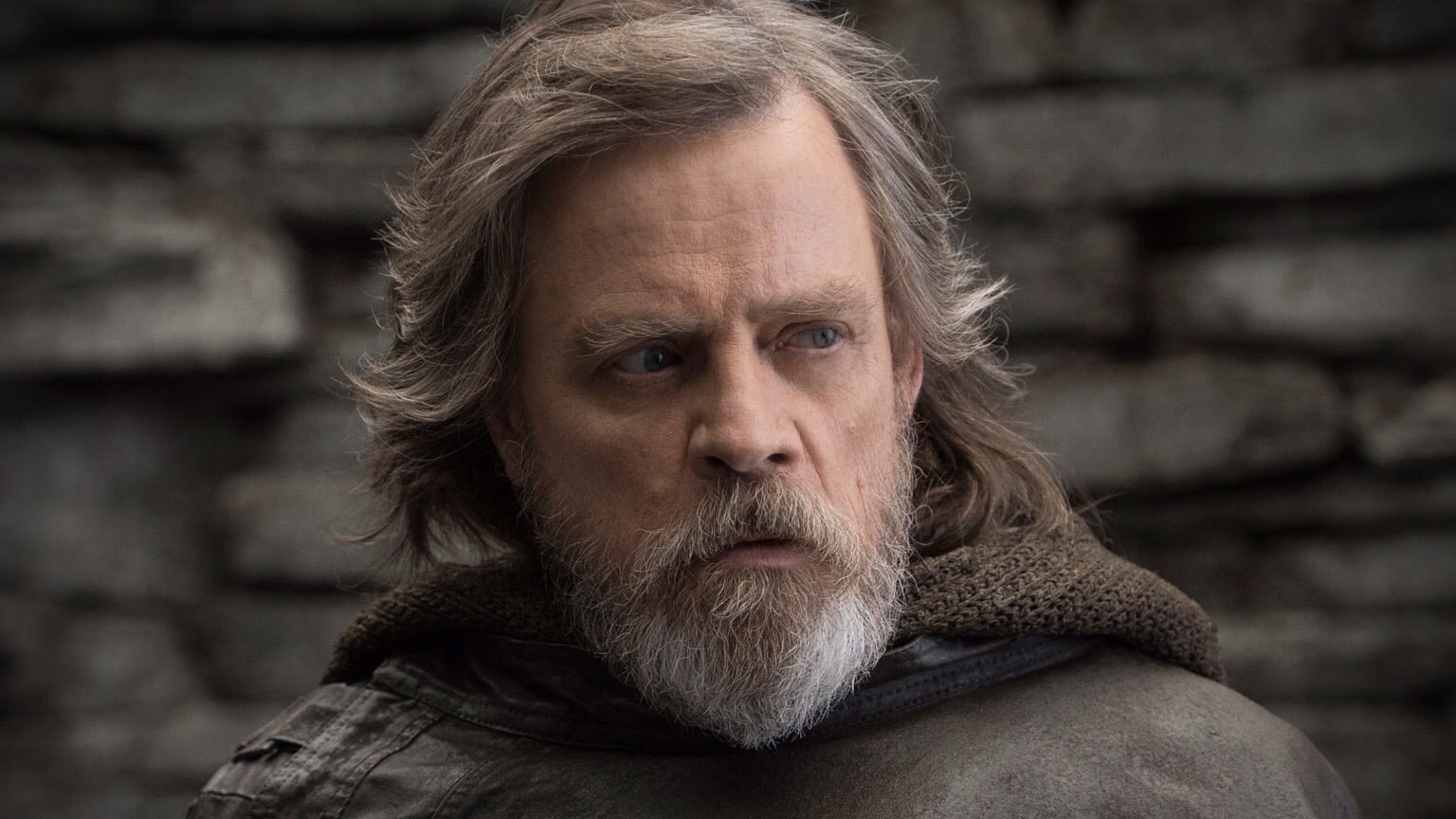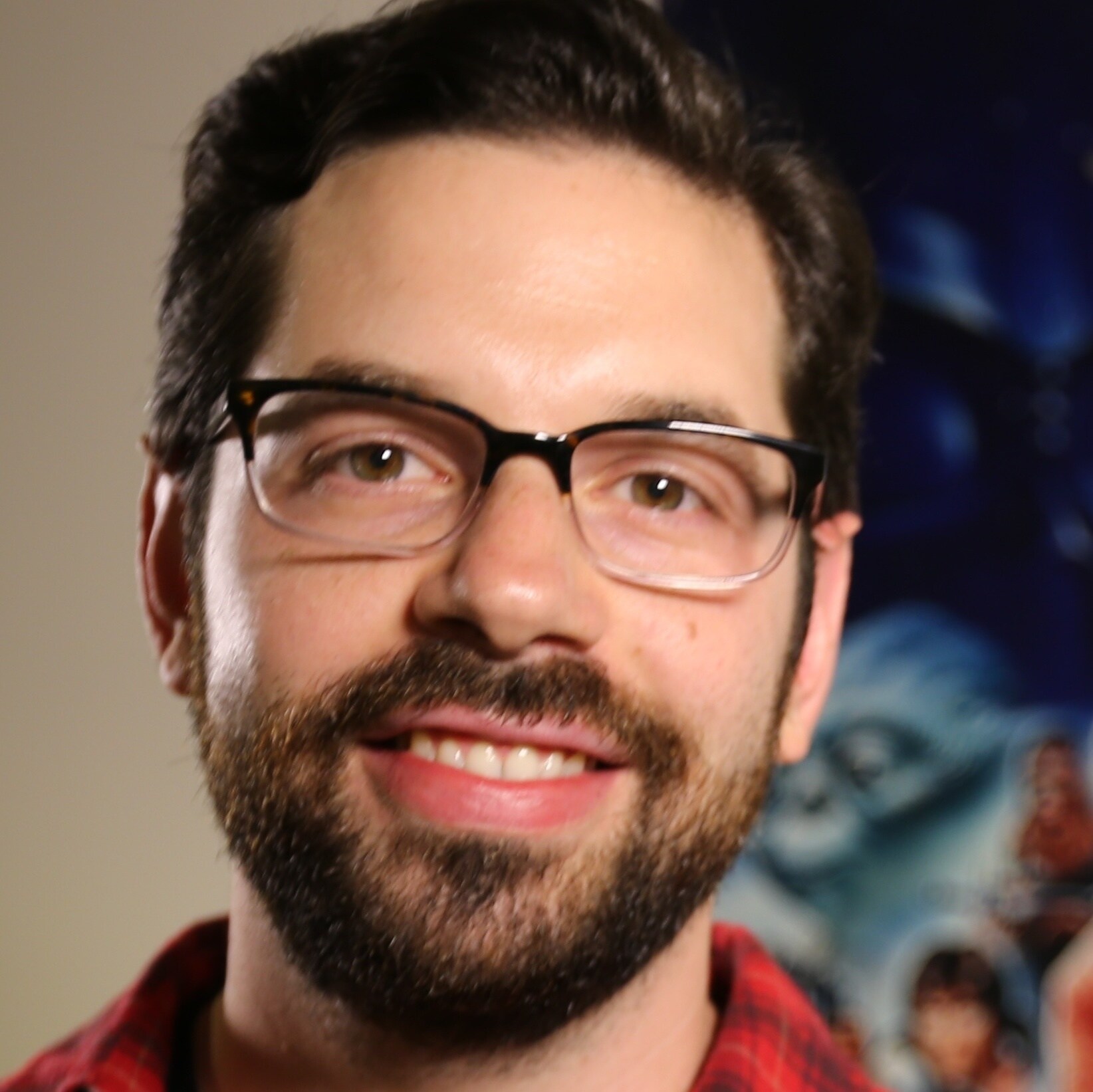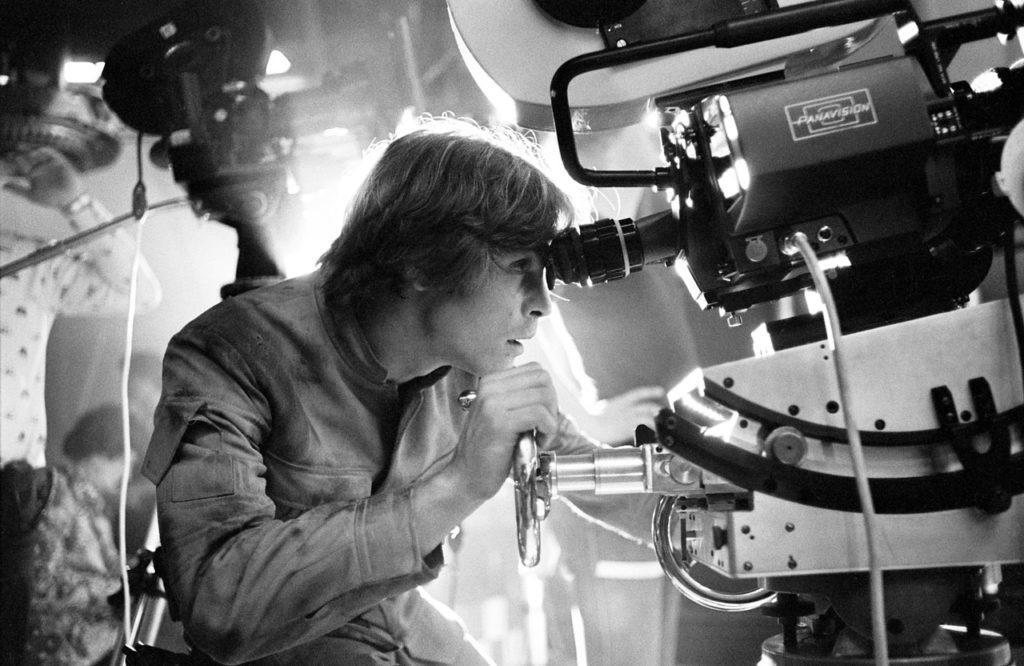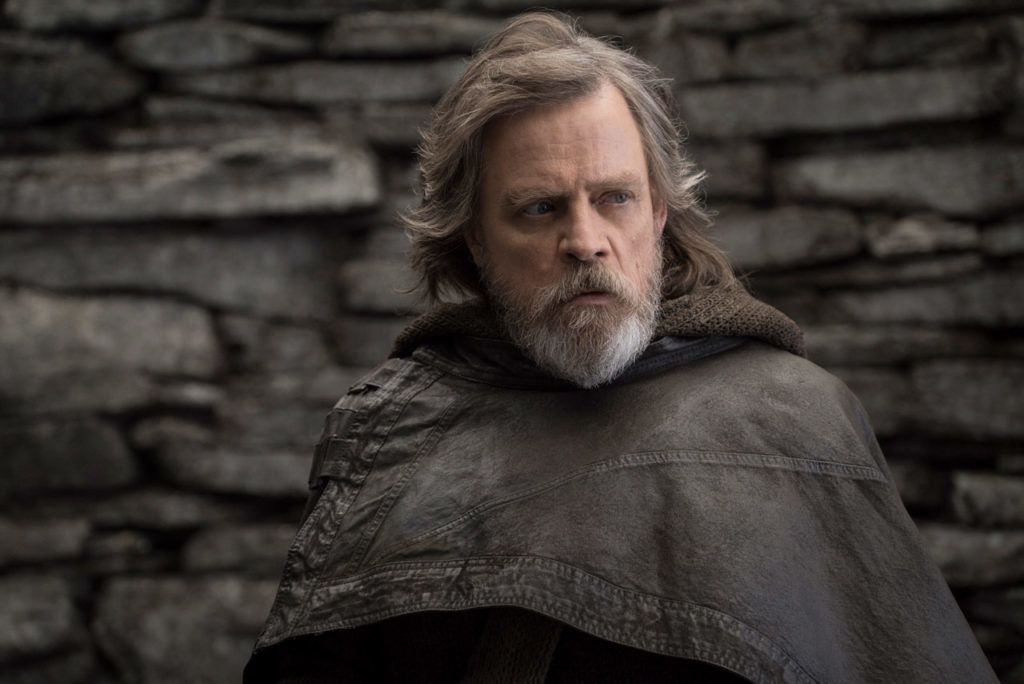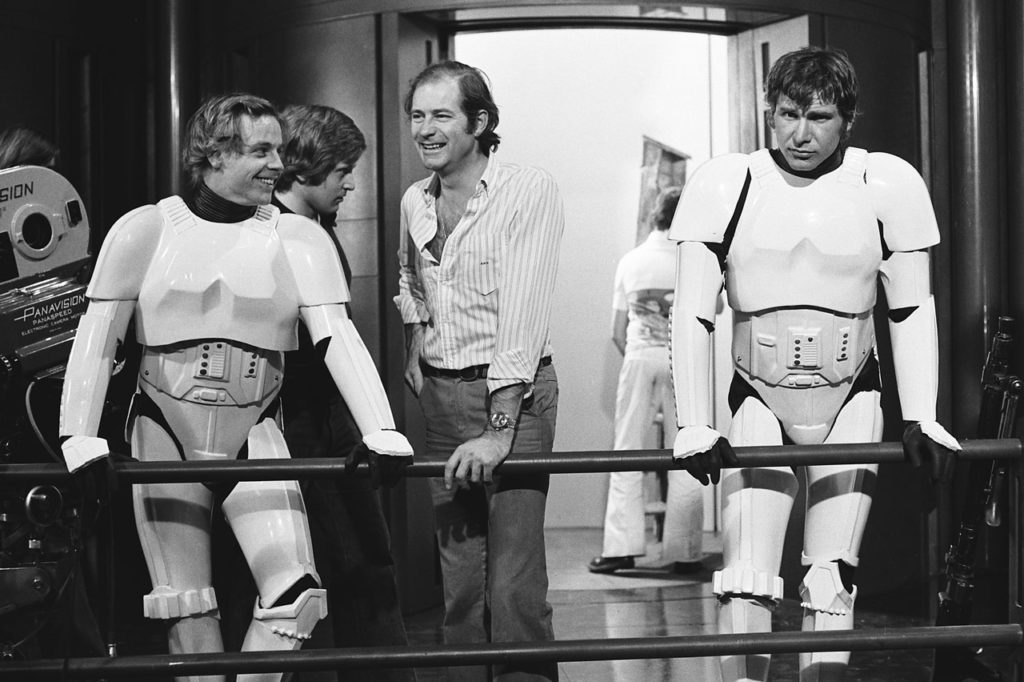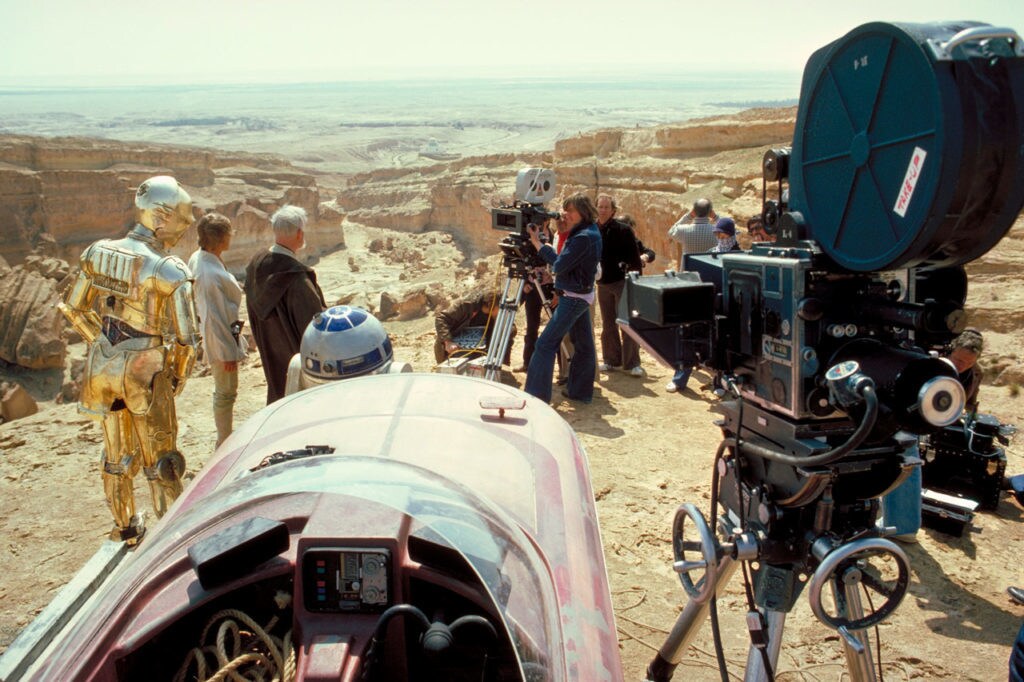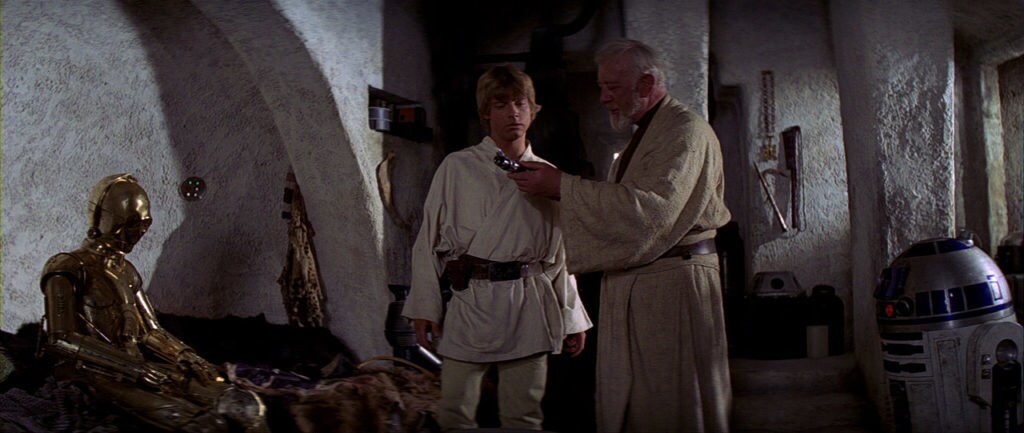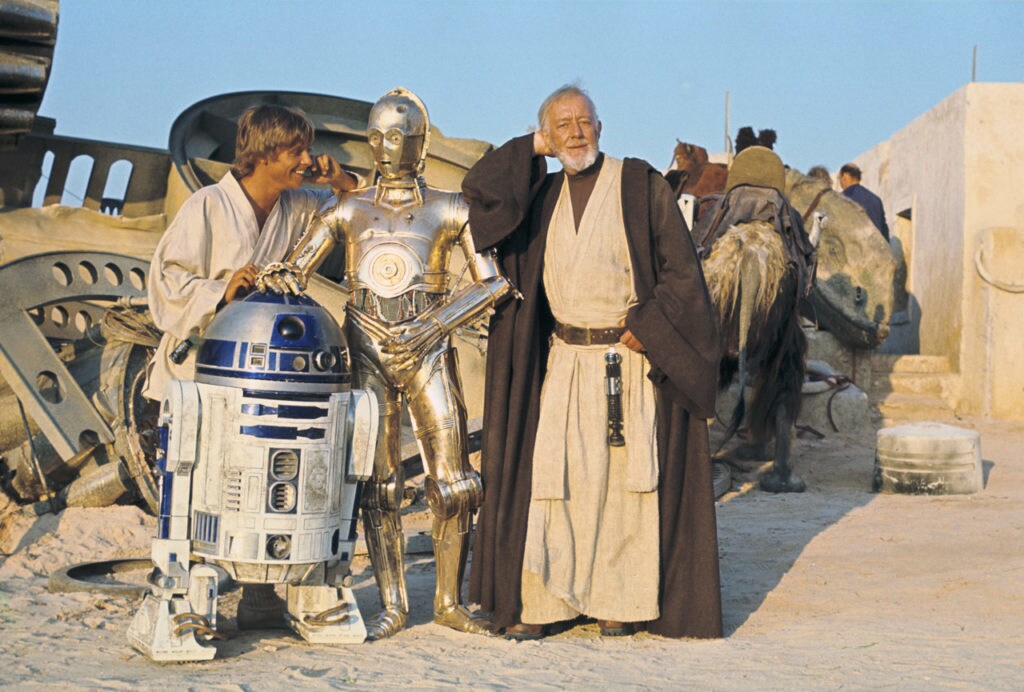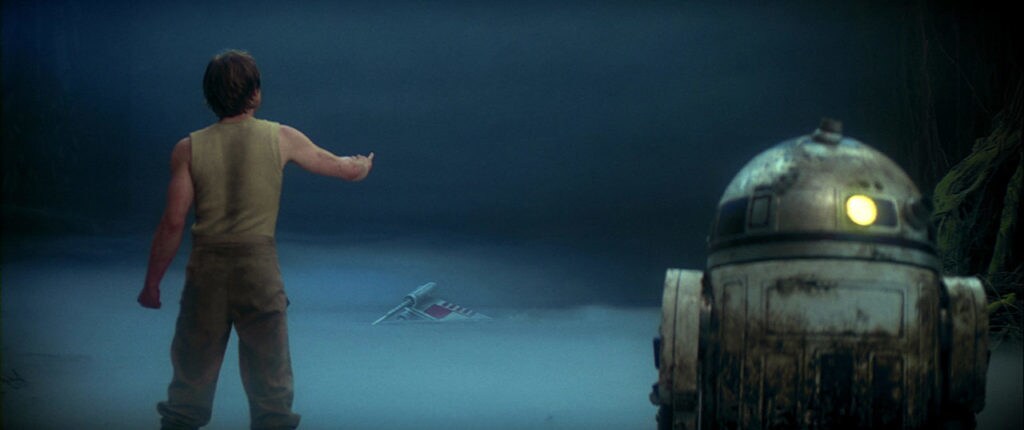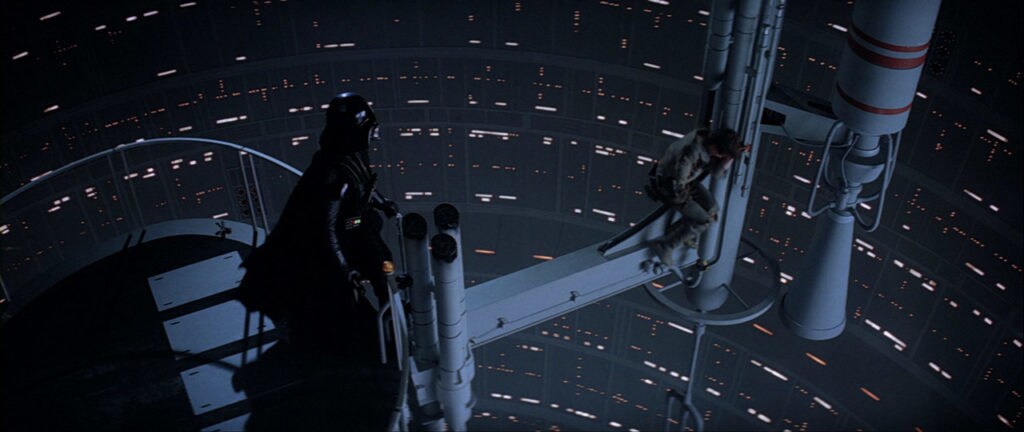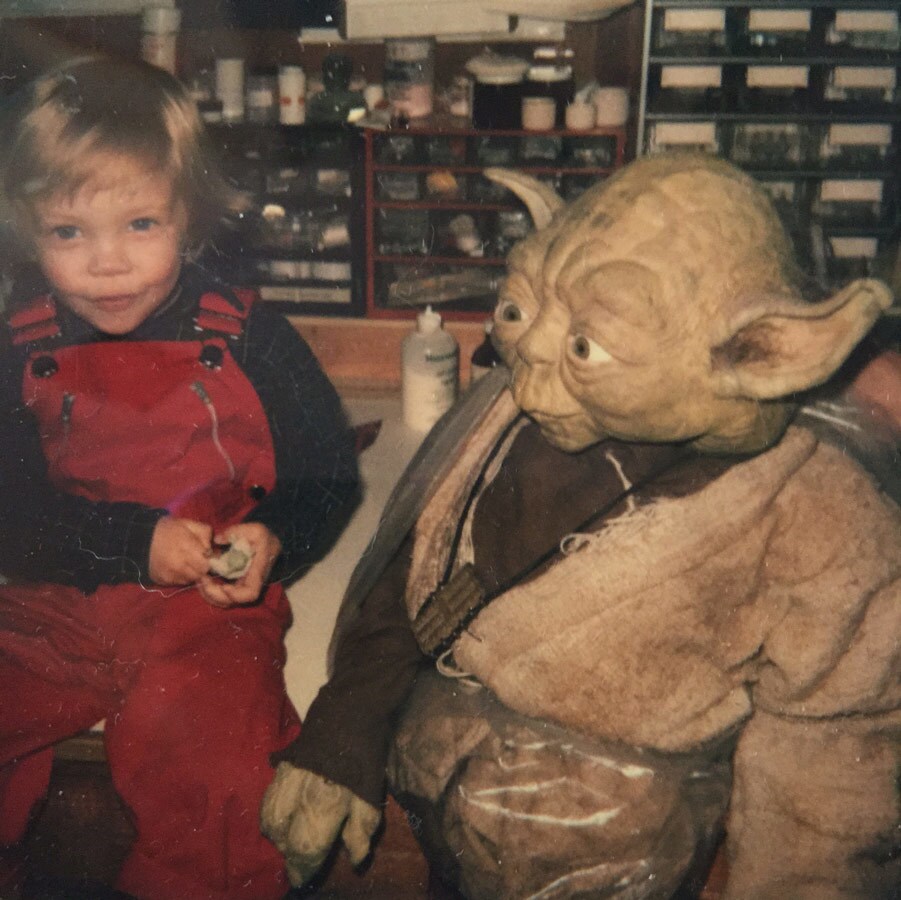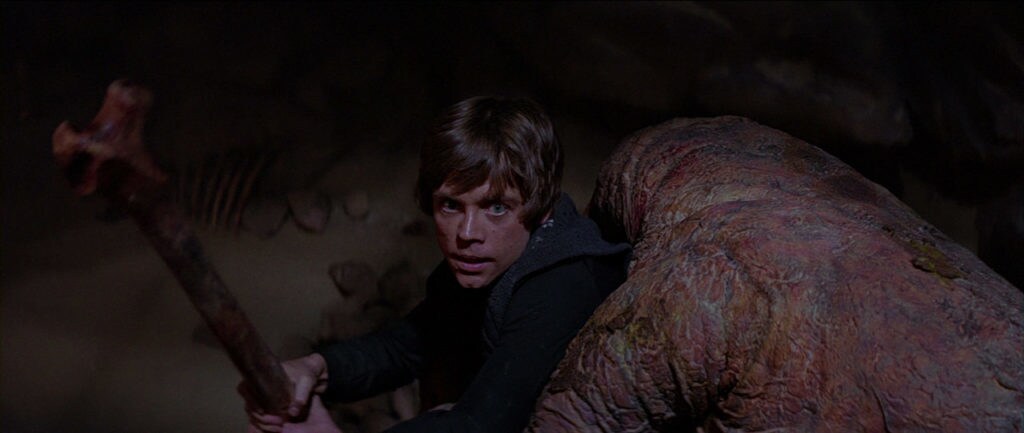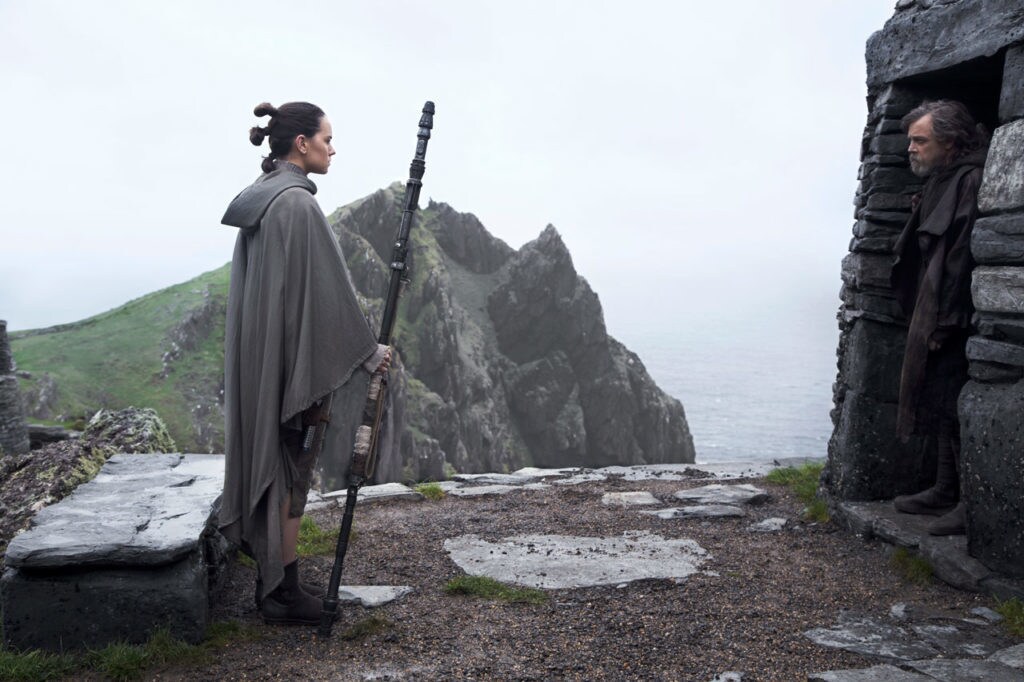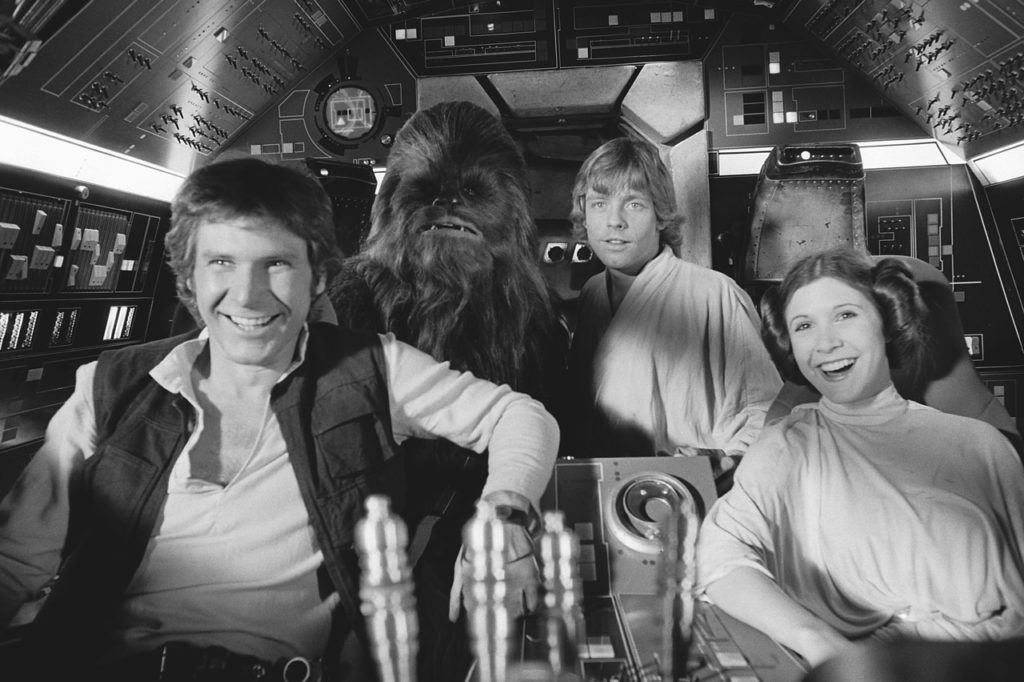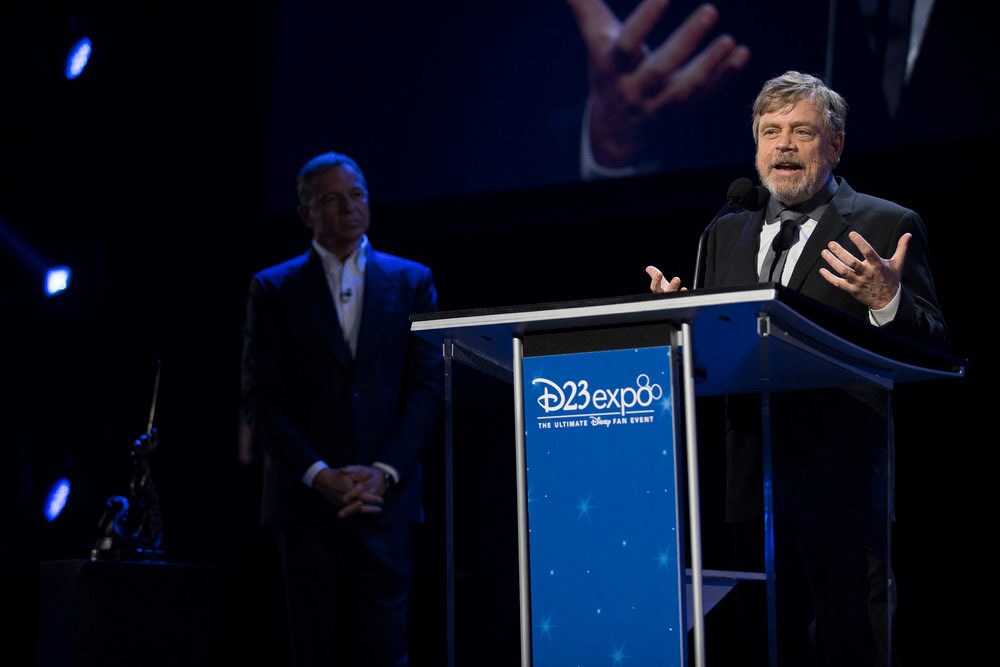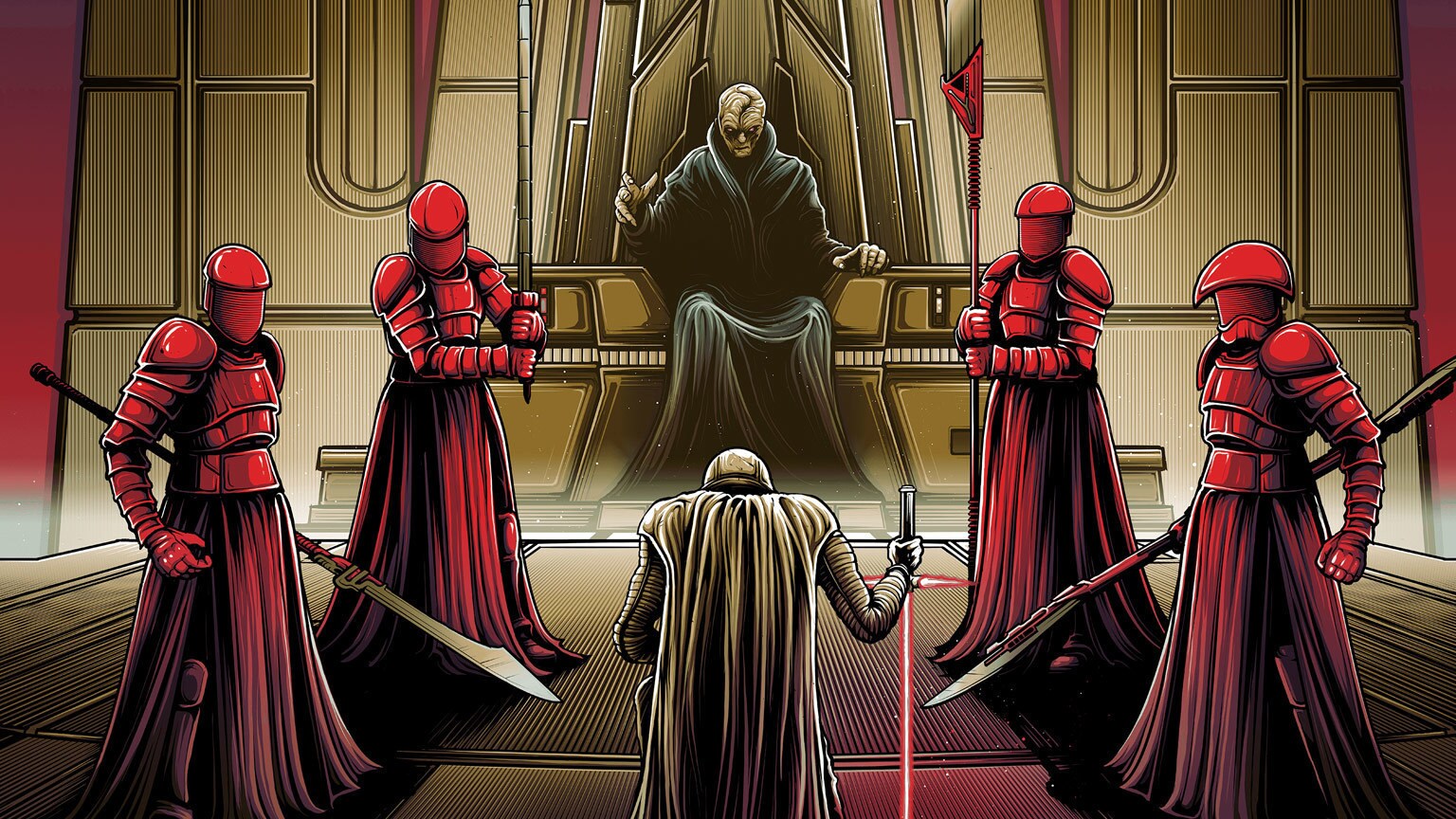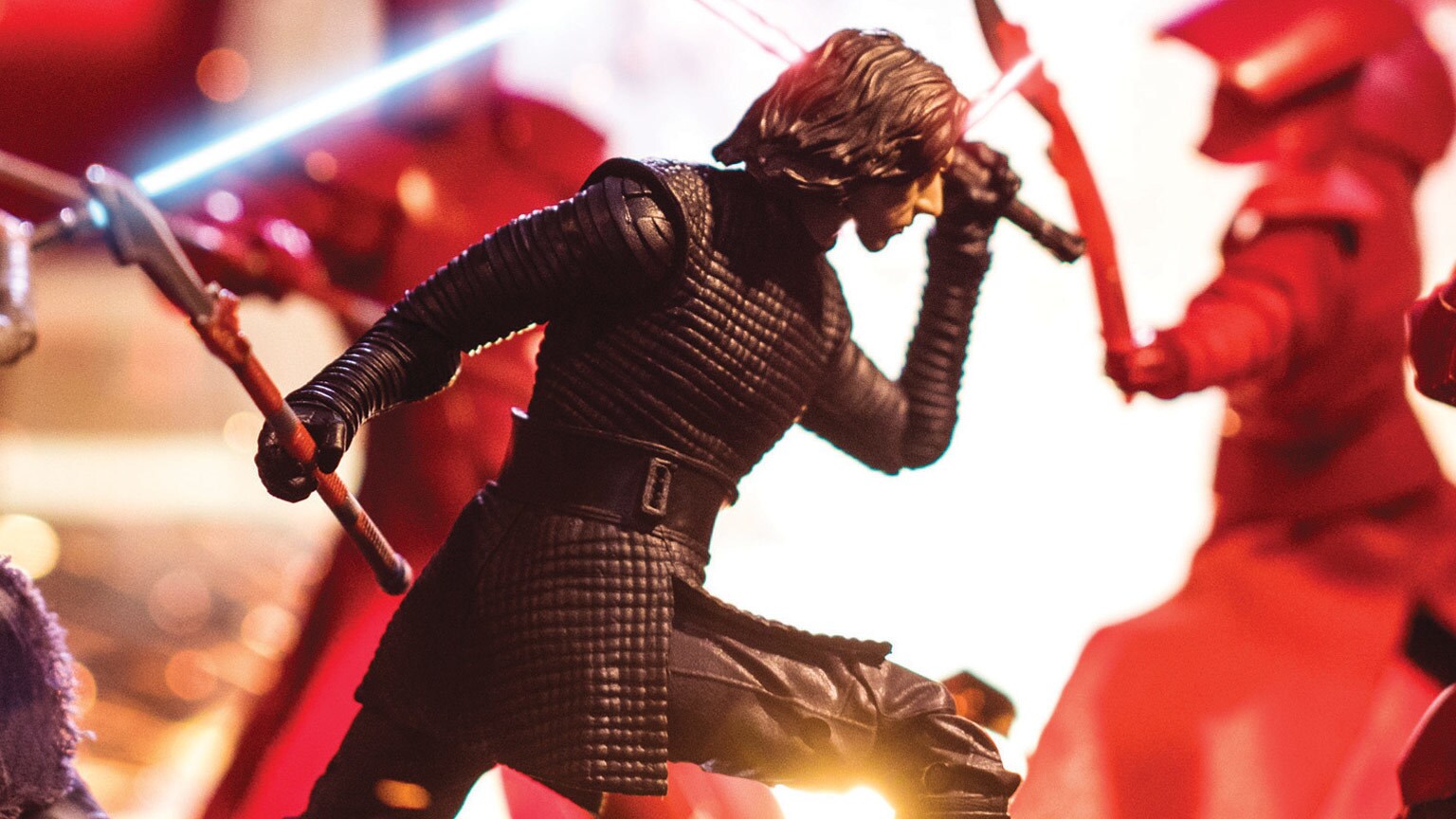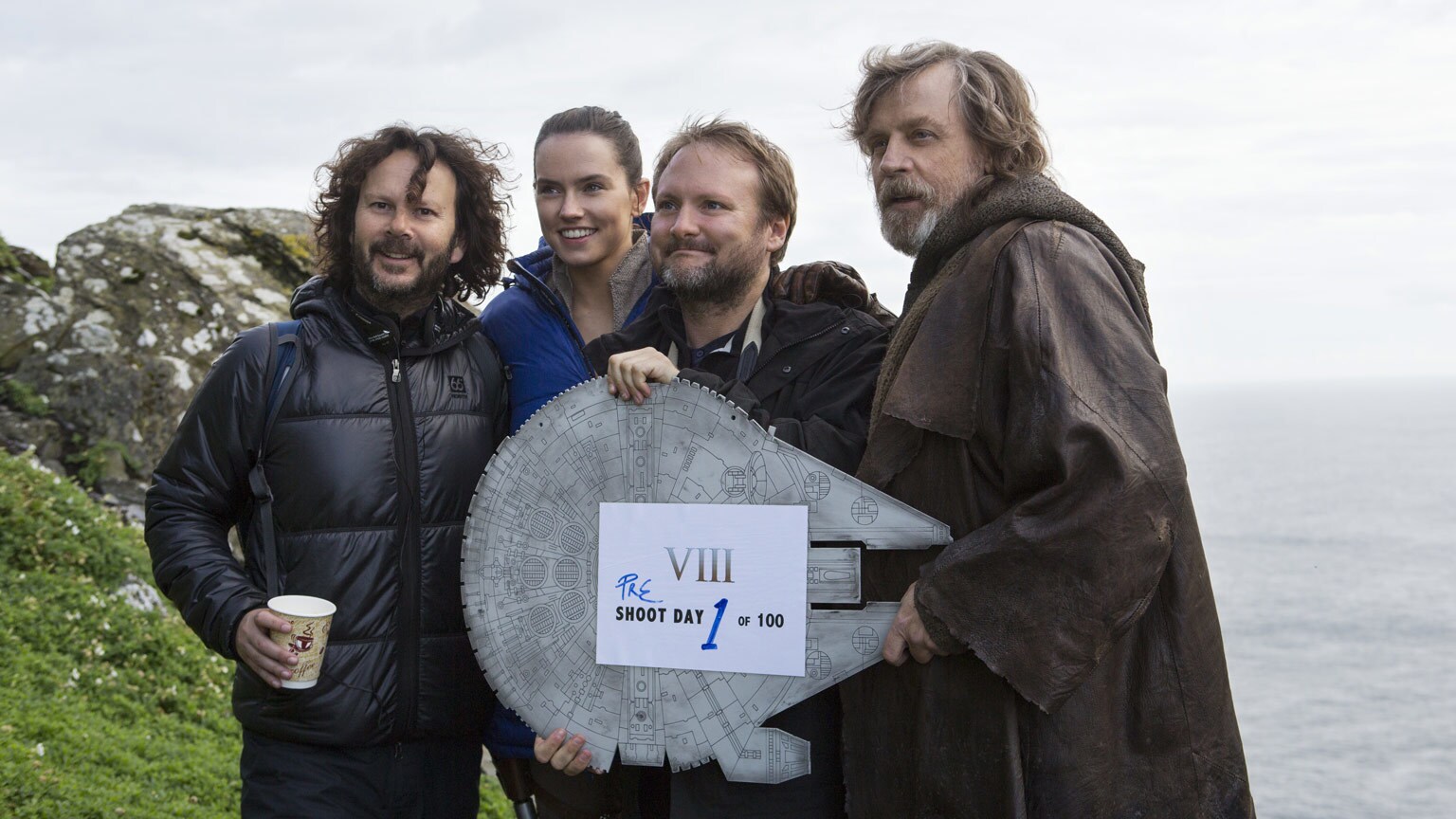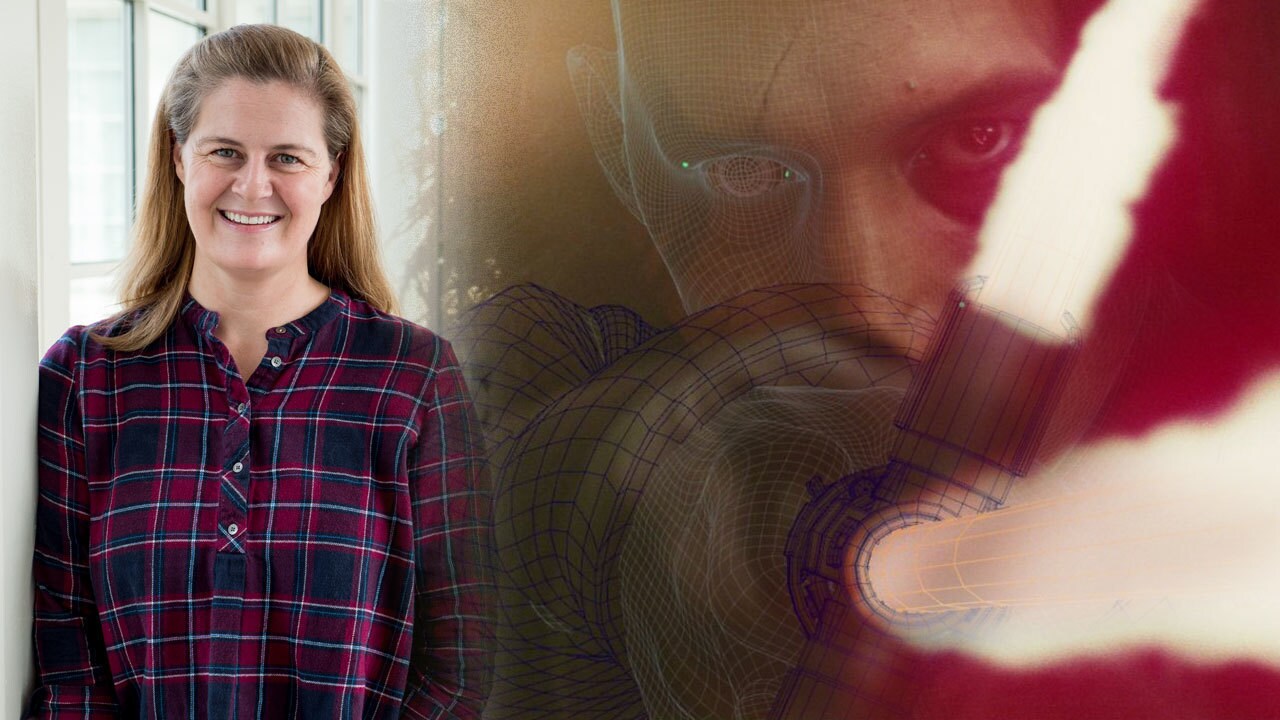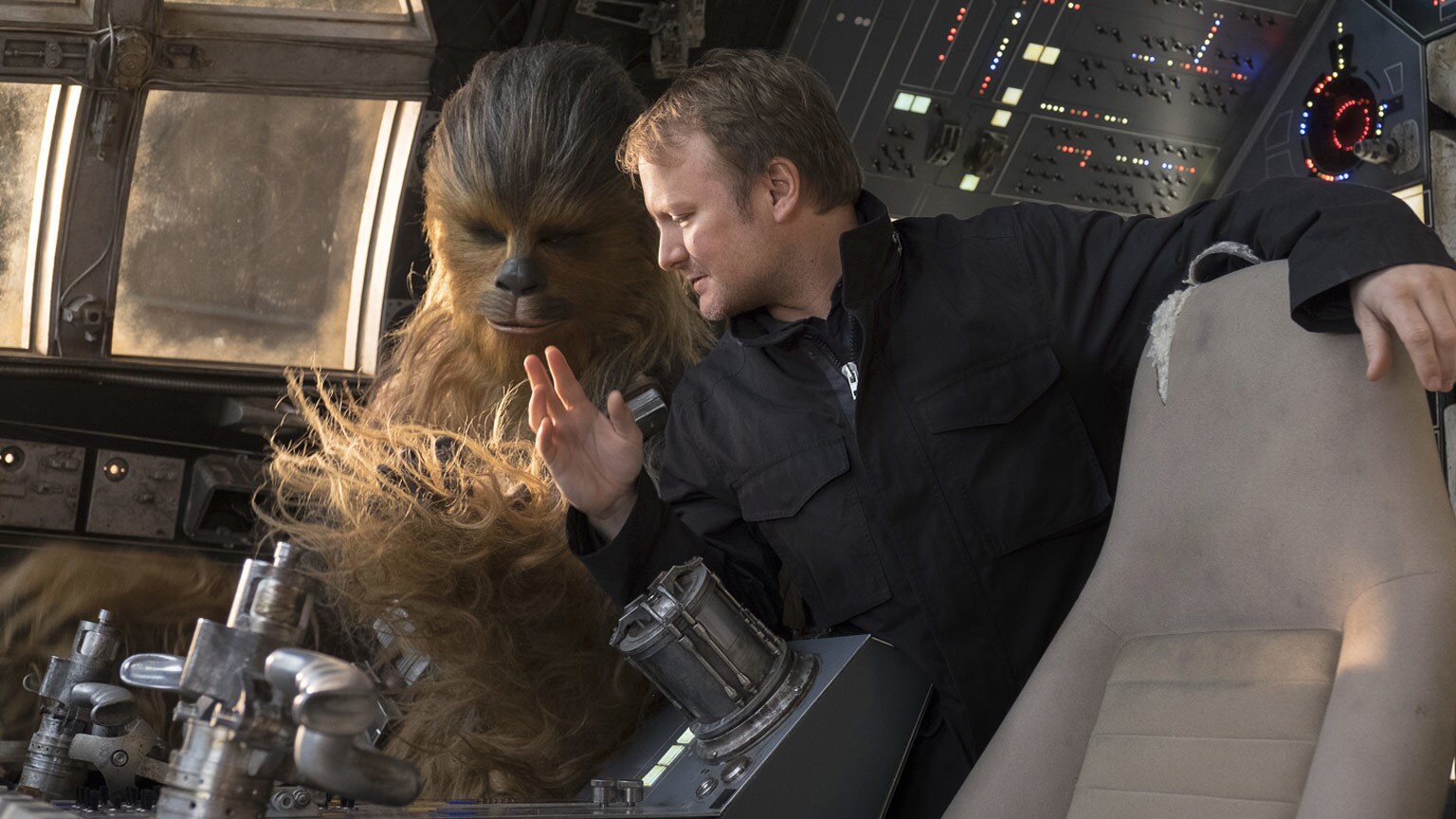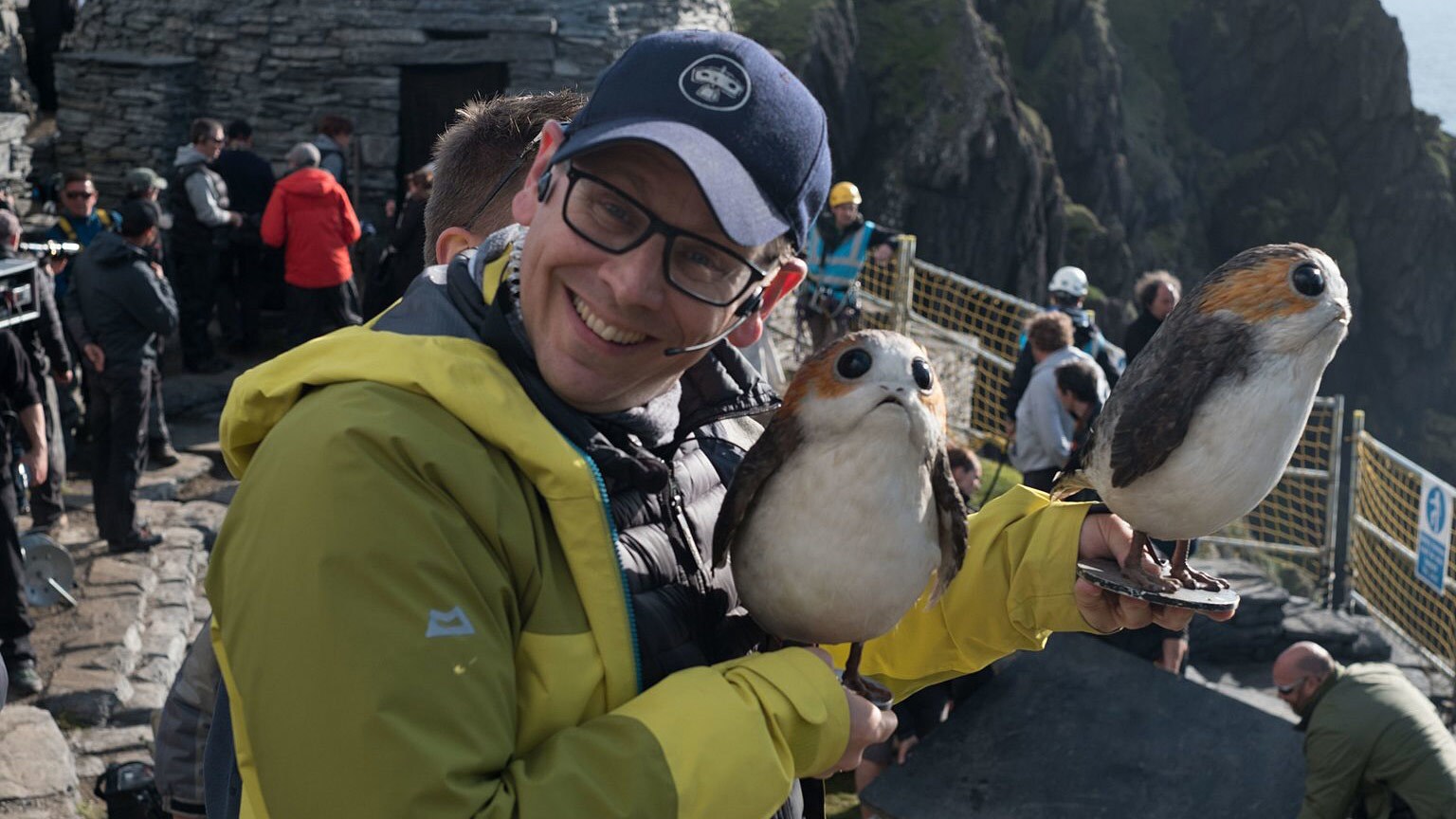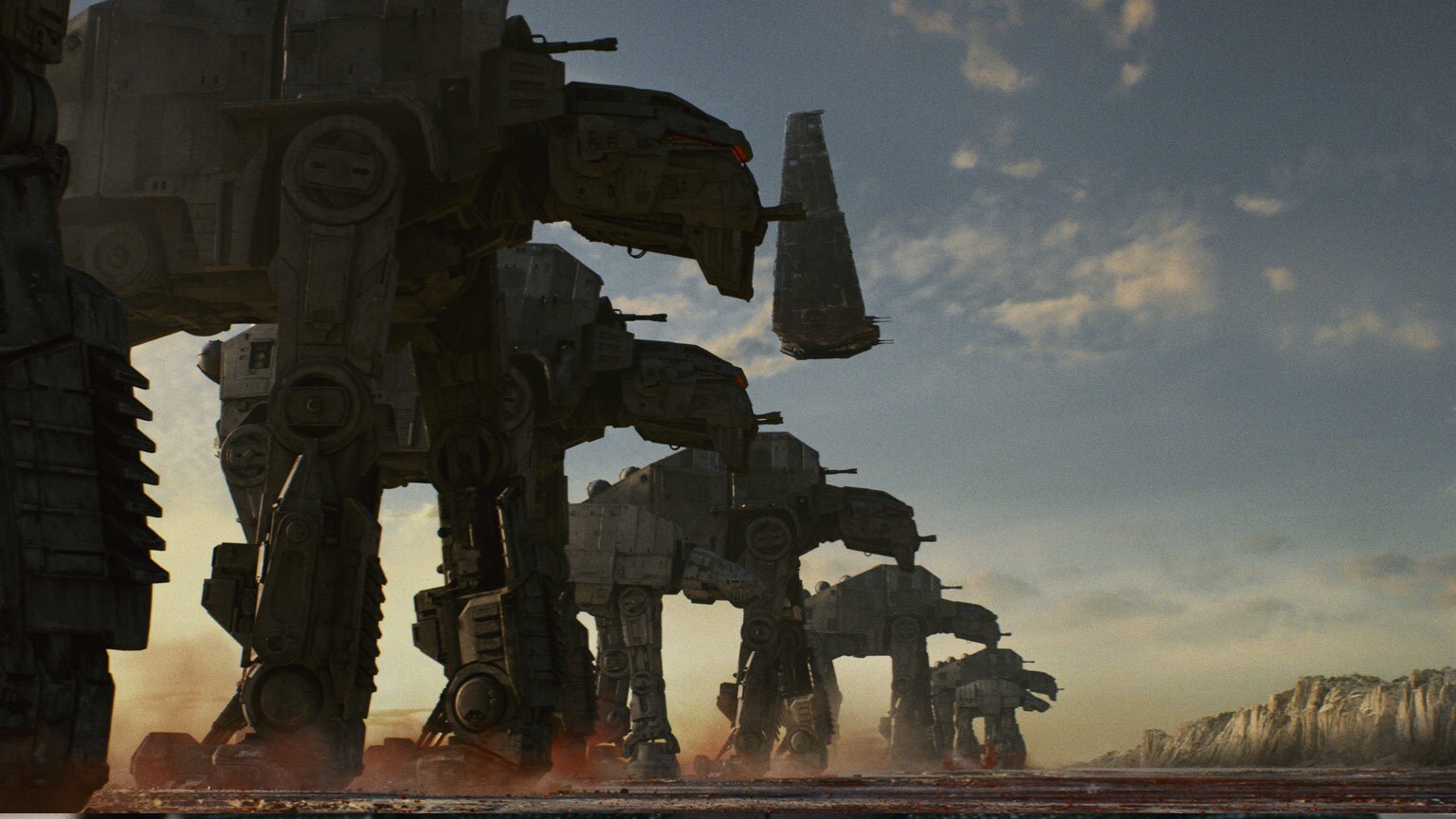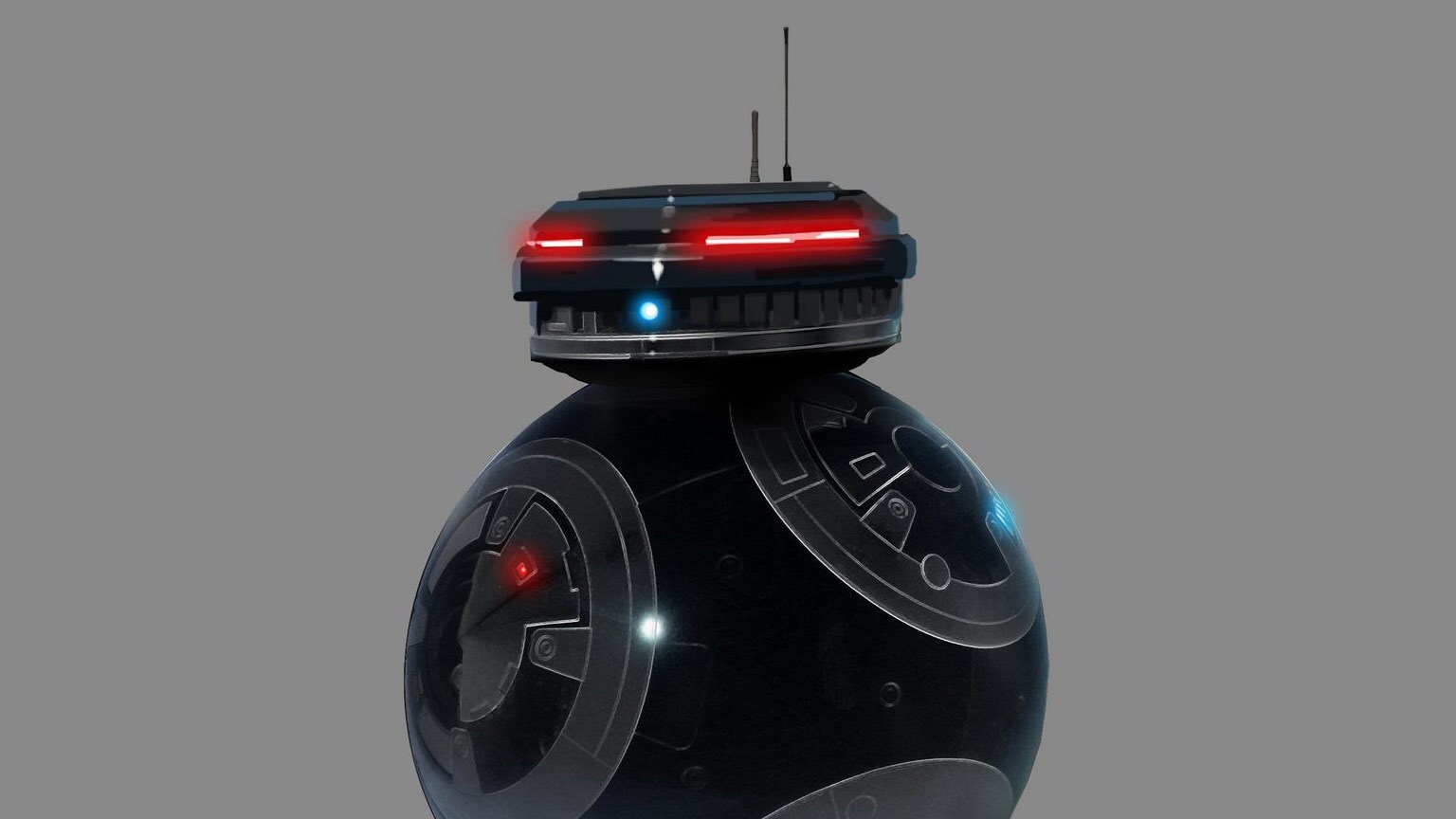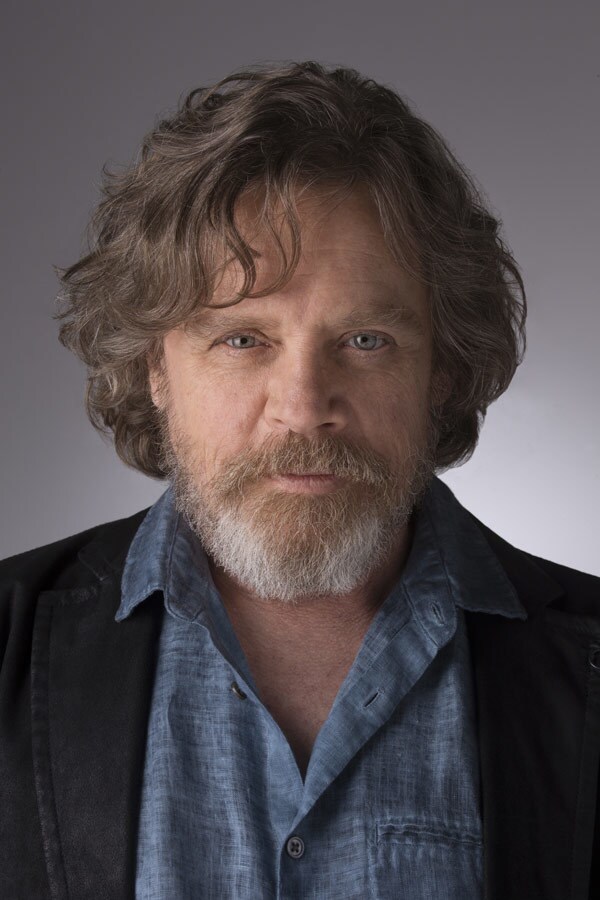
Mark Hamill needs little introduction. As Luke Skywalker, he was the heart of the original Star Wars trilogy, making us laugh, cry, and cheer as he depicted a hero's journey from boy to man. His range in the films is impressive: playing the straight man to a couple of anxious robots; acting as an impatient student opposite a small, strange, green puppet; emerging as a confident, powerful warrior who must save his father's soul. He made us believe in it all, and Star Wars would not be Star Wars without Hamill's gifts. (He's also a supremely talented voice actor, and is the Joker for a generation of Batman fans.)
This has been a big year for Hamill. He was named a Disney Legend and GQ's Icon of the Year. His turn in the critically-acclaimed Brigsby Bear garnered raves, and he even made a memorable cameo in the Mystery Science Theater 3000 reboot as P.T. Mindslap, a shady space-circus ringmaster. Plus, he has a new movie coming out in December, which you might have heard about. In celebration of the Star Wars icon's birthday today, StarWars.com spoke to Hamill about his early inspirations for acting, going to dinner with Sir Alec Guinness, and putting on Jedi robes again for Star Wars: The Last Jedi.
StarWars.com: I’d like to start off with an easy question. Luke is both Rey’s father and Snoke, correct?
Mark Hamill: [Laughs] Wow, you are good at lobbing me softballs. It’s really weird, because they sent us already to London and Berlin on a press junket. And I’m saying to my wife, “It’s really odd going out to do press for a movie that you’re not supposed to talk about. What are we going to talk about? The weather?” But everybody was really nice. And you know, I can talk about everything from Episode I through Rogue One and Force Awakens, but I just really can’t talk about Last Jedi in detail.
StarWars.com: All right. I’ll give you a pass on that one.
Mark Hamill: Thanks, what a kind man you are.
StarWars.com: So to go way back, when did you first know you wanted to be an actor?
Mark Hamill: You know, that’s a really interesting question. I didn’t know specifically that I wanted to be an actor, but from my earliest memories I loved the comic strips that were in the newspapers that were delivered to my door. They made me want to read, and I fancied myself a cartoonist. I tried drawing, I idolized Charles Schultz. Then, when I was like five or six, I saw Clarence Nash doing Donald Duck. I had never thought about the human actors behind the voices of cartoon characters. A light bulb went off in my head. As I said when I accepted the Disney award, Walt Disney was one of the few studios that would draw back the curtain of secrecy and show you how movies were made. Now, I was a mad movie fan. The black-and-white King Kong I just loved as a kid. I read Famous Monsters and learned about stop-frame animation and so forth. So when I saw there’s the camera crew, there’s the construction people who build the sets, there’s wardrobe, gosh, there’s even caterers, I thought, “If I can’t be in the show, at least I can be near the show.” Now, I’m the middle of seven children, so I’m not going to admit that I want to be in show business because I’d get teased and ridiculed. But I knew all along that that’s the business I wanted to be in.
Any chance I got to be on stage [I took]. I hosted a variety show with my ventriloquist dummy in fifth grade. I’m telling you, it’s just an unbelievable feeling to get laughs. With a dummy, you can insult people and blame it all on the dummy. “That’s a terrible thing to say!”
I didn’t know anybody in show business. I didn’t know anybody who knew anybody in show business. You go to New York and try and get on the stage or go to Los Angeles trying to get into television and movies. I graduated high school in Yokohama, Japan. My dad was in the Navy. So coming back, I stopped in Los Angeles for my older brother’s wedding and wound up [pursuing acting].
Sometimes I think I got it backwards, because normally you start on the stage and then you branch out, come west and do television, or even television back in New York. But I didn’t do Broadway until after I had done Star Wars. I wound up replacing in Amadeus. I did the national tour and then they moved me to Broadway. I’ve been on Broadway, I don’t know, half a dozen, maybe seven times. Off-Broadway once. I did regional theater and, of course, the national tour. There’s nothing like a live audience because you get the immediate feedback.
On something like The Last Jedi, it’s such a massive production. The complexity of it is just mind-boggling to me, and how [director] Rian Johnson stays so even-tempered and amiable. I never saw him lose his temper, I never heard him curse or humiliate someone. You know, I’ve had directors that dress people down in front of the whole crew. I was so lucky to be able to have his guidance. Everyone says, “Oh, it must be so fun coming back to Star Wars.” Yeah, it’s fun but it’s also hugely intimidating and bordering on terrifying, because it’s just almost too high profile for comfort. Brigsby Bear is a little film about little people with big ideas. It’s set in the suburbs. I mean, you can relate to it. With something like this, it’s just a massive fantasy film.
I was on one set, and I’m not giving anything away because Rian has already talked about a casino sequence. The set, with 150 actors all dressed in prosthetics and puppetry and robots -- that set alone could probably easily have financed 100 Brigsby Bears. It was easily one of the most opulent sets I’ve ever been on. I’m fascinated not by just the scenes I’m in. When I had free time I would go and observe all these different actors and all these different scenes. The amount of talent that just is unrecognized… That’s why the credits run for an hour and a half. Because it takes thousands of people to successfully mount an epic of this size.
StarWars.com: You mentioned you were a fan of comics and classic Hollywood and movies like King Kong, which all influenced Star Wars. When Star Wars came around, did that side of it appeal to you?
Mark Hamill: Listen, I got that part without having read the entire script. I got a scene. First of all, there was a cattle call, where everybody in town that’s the right age goes in and they look at your size, your height, your looks, your this, your that. And you talk back and forth. They interview you, you don’t really hear them talk about the movie. And then you get the scene, you do the scene, and I’m trying to figure out, “Wait a second. Is this straightforward? Is it kind of a parody or an ironic sendup?” I tested with Harrison [Ford] and I couldn’t [figure it out]. George [Lucas] just said, “Well, look, let’s just do it and we’ll talk about it later.” Which is classic George, because you learn later that he says, “Let’s just do it,” and then he never talks about it later. [Laughs]
But when I finally got the part and they said they were sending the script over, I was living by myself in a one-bedroom on the beach in Malibu. It was before I was married. And I get the script and I sit down, and I’ll never forget the chair I was sitting in, facing the ocean. I open the title page and it says, “The Adventures of Luke Starkiller, as Taken from the Journal of the Whills, Saga Number One: The Star Wars.” And I thought, “Wait a second…” Because when I tested, I figured Harrison’s a leading man. So I thought, “I’m playing his sidekick, right?” Reading it, I’m going, “Wait a second. Wasn’t I reading for Luke Starkiller? This can’t be right.” Anyway, I started reading it and you can imagine. I mean, “A long time ago in a galaxy far, far away.” Then you read the crawl and you’re right in the action. It’s just such an economical example of storytelling.
Well, you know, an hour later I’m just floating above that chair thinking, “My gosh!” One of my favorite films of all time is The Wizard of Oz and that sort of reminded me of it. You know, if Dorothy were a boy instead of a girl getting swept off his boring desert planet, or Kansas, into a fantastical world where there’s a phantasmagorical collection of creatures and robots and villains and heroes. I was just astonished. I thought, “How are they going to do this? The floating cars and the light swords…” It took me a while to get all the terminology. People freak out -- They’re lightsabers! Well, I know that now.
Besides Japan and a couple of trips to Tijuana when we lived in San Diego, I had never been to Europe. I mean, I’d dreamed of going there because I was 11 when the Beatles hit and I thought, “My gosh, I’d love to go to England.” That’s where it was all happening, the swinging ‘60s and all that. So to be able to go to England and, on top of that, work with one of my favorite actors, Sir Alec Guinness... My mom was a huge fan of his and since we were on military bases, they’d show a new movie every night, and sometimes they’d show classics. So on the big screen, we saw The Lady Killers, Lavender Hill Mob, The Horse’s Mouth. She was a huge Guinness fan, so it was like the thrill of a lifetime, but also hugely intimidating because just the idea of being in the same room with Alec Guinness, I thought, “I don’t know if I’m going to be able to talk in front of this guy.”
StarWars.com: On that note, I’d like to run through a couple of scenes from the trilogy and maybe you could share some memories that you might have from shooting them.
Mark Hamill: Okay.
StarWars.com: Obi-Wan presents Luke with his father’s lightsaber.
Mark Hamill: Well, I knew this was going to be an iconic weapon in the film. And one of George’s brilliant touches was the lived-in atmosphere. You know, the spaceships were beat up with dents and oil drips. It had that Western movie feel. It was gritty. It wasn’t gleaming sleek spaceships and so forth. It really looked like a lived-in galaxy. Any scene with Alec was exciting for me and, again, I just fell right into what I was supposed to be, which was a young student in awe of a true master. So that came naturally. Just listening to him, his voice is like a great massage on the back of the neck. You know, we say [in a gruff accent], “Woree-uhs.” And he says [in Alec Guinness voice], “Warriors.” Almost three syllables.
He took me out to lunch before we shot to get to know me. Again, I was so formal and I wanted to talk about all those movies I mentioned, and he said [in Alec Guinness voice], “No, no, no. I want to hear about your career.” I thought, “Really? You want to hear about a soap opera and a dog food commercial?” I mean, come on. But he couldn’t have made me more comfortable. The first scenes we shot were in North Africa, so Tony [Daniels] and Kenny [Baker], Threepio and Artoo, went. Sir Alec went, and Lady Guinness and I went. So that was a great period to get to know him and have dinner with him, hang out with him on location between setups and so forth. It was a great introductory period. When we went back to London it was like starting a whole new movie, because Harrison hadn’t come over, Carrie [Fisher] hadn’t come over.
But it’s a pivotal scene when he gives me the lightsaber and says he wants me to do this, and I say, “No, I can’t, I’m going to get in trouble at home.” It’s relatable. Luke was nothing. He didn’t appear to be anything special. So for the audience to be able to see somebody like that, that they thought, “Well, you know, the space pirate is a little intimidating, and I don’t know how I would be around royalty, and the wizard is other-worldly.” Luke was like a guy you’d think, “Oh, I could hang out with him and be comfortable.” And what teenager can’t relate to, “Oh my god, I got to get home. I’m going to be in trouble for being late from my parents.” With all the fantasy going on, it was always rooted in things that the audience could relate to. So I knew it was a pivotal scene, but I also wanted to throw it away. In other words, not overemphasize it as anything special. It’s just another moment in Luke’s journey.
StarWars.com: Luke tries and fails to raise the X-wing from the swamp.
Mark Hamill: One of the things that was such a great joy to discover when I read Empire Strikes Back is that it was deeper. It was more cerebral, it was more spiritual. A lot of that had to do with Yoda and his philosophies.
You know, Luke always is like a couple of beats late in recognizing what’s right in front of him. He doesn’t recognize Obi-Wan. He’s looking for, I don’t know, a six-foot-tall, brawny, chiseled, physically-capable man as the great Yoda, and he’s trying to shoo this little reptilian bother out of his rations. He’s right in front of him and he doesn’t sense it. For a guy that has the Force, he’s pretty clueless many times. And again, it goes back to relatability.
I just thought instead of a retread of the first one, that one was really challenging for the audience, especially since it ended so tragically with one of the great twist endings of all time. I’ve said this before, but they kept that line secret: “I am your father.” What was in the script was already a fantastic twist. Vader says [in Darth Vader voice], “You don’t know the truth. Obi-Wan killed your father.” And I played it just as you see it. “No!” and all that. But [prior to shooting] they pulled me aside and [Irvin] Kershner, the director, said, “Look, I’m going to tell you something. George knows, I know, and when I tell you, you’ll be the third person that knows. So if it leaks, we’ll know it’s you.” When he told me what it was, I said, “You’ve got to be kidding me!” Because I already loved the idea that in the twist it was Guinness that was the bad guy. Within two or three days of shooting that scene… And mind you, we’re way up with giant wind machines going, and even Vader’s line is muffled by the mask. [Recites line in muffled Vader voice.] I couldn’t even hear him. But somehow, within two days, three days, on the front page of one of the tabloids in a little box, it said, “Guinness Head Baddie in Star Wars 2.” Now, for people who don’t understand, “head baddie” means main villain in English speak. I was delighted that we leaked fake information. But that was the start of a long association with intense pressure to avoid leaks or spoilers, because when we made the first one, no one cared.
StarWars.com: Well, just imagine if you had the Internet back then!
Mark Hamill: Oh my god, you’re so right. With people equipped with cell phones, every time you’re out in public… Who knows what could have happened in those days.
StarWars.com: Next question comes from a fan -- a Nathan Hamill in California.
Mark Hamill: Oh my gosh.
StarWars.com: I think you might know him.
Mark Hamill: I might be familiar with him. [Nathan is Mark’s son.]
StarWars.com: I asked him if he had any questions for you. He wants to know -- what was the deal with Luke’s plan in rescuing Han in Return of the Jedi? Because if you break it down, they give up Chewie. Lando, Artoo, and Threepio are kind of stuck on the inside in Jabba’s palace.
Mark Hamill: Right.
StarWars.com: And if Leia actually escaped with Han, then what happens to all of them? Couldn’t Luke have just gone in himself and saved them all the effort? So what’s your take on that?
Mark Hamill: Well, let me put it this way. When they told me they were going to do Special Editions [in 1997] and release them in the movies, I said, “Great, send me a tape. I’d like to see what they’ve done.” They said fine, and then when my kids got word of it, they said, “Dad, they’re putting the movies in the theaters!” I said, “Yeah…?” And they said, “We’ve never seen them on the big screen!” I thought, “You know, that never occurred to me. I owe it to them to bring them to see them on the big screen.” It was one of those things. I don’t watch myself. It’s not like, “Oh, what should I watch tonight? Oh, I know, I’ll put on The Big Red One. I’ll put on Slipstream or something.” It just doesn’t occur to me. I’d rather watch Laurel & Hardy or The Honeymooners. So I went and I saw all these in the theater. I was reminded again how durable they are. You know, because there are no elements that really date you. You see movies where they’re driving old-fashioned cars, or their clothing [is dated]. I mean, little kids that don’t have any concept of time think we made the movies last week. But it was quite a revelation to see each one as they came out, on the big screen, and again, that was that. I fulfilled my obligation as a father, they saw each one of the movies, and then I’ve never seen them again. So when you just described all that about Return of the Jedi, I just lost you completely. I forget that plan and I don’t remember!
All I remember is, when I got into that giant rancor hand, I had a Fay Wray moment. Because I imagined what it would be like to have been in King Kong and to be fighting dinosaurs on an island. I mean, when I went out to play, and everybody wanted to play cowboys and Indians or G.I. Joe or something, I was organizing kids down in the canyon to come on the expedition on Skull Island. I would do a running narrative. “And then a giant T-rex comes over the horizon!” The kids would scream! [Laughs]
So there I am in the rancor hand and just thinking, “Oh my god.” You were asking about my reaction. Here was somebody that idolized Willis O’Brien and Ray Harryhausen and special effects artists in general. So it was like a dream come true. I’ve always been a fan, and to be in something like that was beyond my wildest dreams.
I’m kind of intrigued now, because people use logic and they’ve seen these movies so often that, like you say, they’ve discovered a flaw in the logic or the feasibility of whatever Luke’s plan was. You hope it will be a hit. You hope people will go back and see it two, maybe three times, because that’s what makes a movie a super hit. We never expected people to see it 30 times and write dissertations and theses and discuss it in that kind of detail. Like I tell people when I talk in front of large crowds, we called him the “medical droid.” We didn’t call him 2-1B. They didn’t name him that until he became a toy and they had to copyright the little action figure. So they know the movies better than I do. I hate to disappoint you, but it’s true.
StarWars.com: All right. Well, we thought if anybody could answer it, it would be you…
Mark Hamill: Well, no. If anybody could answer it, it would be you! Because you run this website that probably has more knowledge of what we’re talking about than I do. In fact, do you have a theory? Let’s hear what you think about that.
StarWars.com: I think Luke wanted to try to get things done as peacefully as possible before he had to enter the picture.
Mark Hamill: Yes, exactly. A Jedi would want to avoid confrontation. Yeah, that’s basically right. I think.
StarWars.com: So I know you can’t say too much about The Last Jedi, and I think we both would get in trouble if you did. But stepping back into a role for a character 30 years after the fact is a rare opportunity for an actor. I’m curious how you approached it in terms of going back to that place where you were, playing him so long ago, but then also having to update it for where Luke might be at now in The Last Jedi.
Mark Hamill: Okay, well, your job when you read a script is to figure out what is required of your character to make the screenplay as successful as it can be when it’s realized on film. What’s my role in the overall scope of things?
The problem here was that he’s had, like you say, the 30-plus years of history, which is never really spelled out. J.J. [Abrams in The Force Awakens] used the character, it was so ambiguous. I look back now and I say, “What else was he supposed to do?” I mean, here he has to come up with this whole new set of characters. He has to finish the Han Solo storyline. If he had to also include me, it would have been just laden with exposition. Better to shove Luke down the road and resolve his story later.
StarWars.com: Let’s say P.T. Mindslap brings his traveling circus to Luke’s island. What happens?
Mark Hamill: [Laughs] Well, listen. He would be a sensation, because we’re sort of starved for entertainment on Ahch-To.
StarWars.com: Now that you have some distance from the original trilogy and you can see the impact of the new films, what does being part of Star Wars mean to you today?
Mark Hamill: What a great gift. People say, “Are you worried that you’re only going to be remembered for Luke Skywalker?” I say, listen, for someone who didn’t expect to be remembered for anything, it’s a win-win. I mean, that’s probably why I get such delight being accepted in the role of the Joker, because I’ve been a Batman fan all my life. I said, “Gee, I wish I could do a villain that’s never been done on the TV series or the movies.” Joker seemed like almost too much of a responsibility. But again, I love challenges, I love doing things I’ve never done before, and to have a character that’s so diametrically opposed to what I’m known for, it just gives me great, great joy. Comic book fans tell me, “When I read the comic books now, I hear your voice.”
That, to me, is a reward that just never stops giving. It’s the fact that people feel they know you, they feel you’re a part of the family. They relay all these stories about, “I met my wife on line for Empire, and we had a child by the time of Return of the Jedi and we named him Luke.” It’s really moving. If you came to my house, I don’t have mementos from the movies all over. It’s not something I confront every day. So it’s when I go out into the public or go to like, the New York Comic Con, and you’re standing there in front of thousands of people that are just riveted on your every word. It’s almost like an out-of-body experience. It’s like observing someone else walking the red carpet, someone else getting the Disney Legends award. It’s hard to comprehend that you had an effect on anybody that’s so positive. I don’t take it for granted, and that’s why I love the fans so much. If it weren’t for them, I wouldn’t be talking to you right now.
Star Wars: The Last Jedi arrives in theaters December 15, 2017.
Dan Brooks is Lucasfilm’s senior content writer and editor of the StarWars.com blog. He loves Star Wars, ELO, and the New York Rangers, Jets, and Yankees. Follow him on Twitter @dan_brooks where he rants about all these things.




